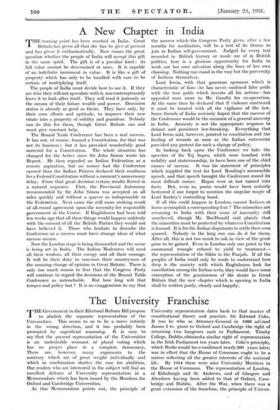A New Chapter in India T HE turning point has been
reached in India. Great Britain has given all that she has to give at present and has given it enthusiastically. Now comes the great question whether the people of India will accept this gift in the same spirit. The gift is of a peculiar kind ; its full value cannot be determined at once. It is capable of an indefinite increment in value. It is like a gift of property which has only to be handled with care to be certain of multiplying itself.
The people of India must decide how to use it. If they are wise they will not speculate with it, norcontemptuously leave it to look after itself. They will tend it jealously as the means of their future wealth and power. Dominion status is already as good as theirs. They have only, by their own efforts and aptitude, to improve their new estate into a property of solidity and grandeur. Nobody can do this for them, though Great Britain can and must give constant help.
The Round Table Conference has been a real success. It has not, of course, framed a Constitution, for that was not its business ; but it has provided wonderfully good material for a Constitution. The whole situation has changed for the better since Sir John Simon wrote his Report. He then regarded an Indian Federation as a remote aspiration, but no sooner had the Conference opened than the Indian Princes declared their readiness for a Federal Constitution without a moment's unnecessary delay. From that great decision certain results flowed in a natural sequence. First, the Provincial Autonomy recommended by Sir John Simon was accepted on all sides quickly and without a quaver as indispensable to the Federation. Next came the still more striking result of all-round agreement upon the necessity for responsible government at the Centre. If Englishmen had been told ten weeks ago that all these things would happen suddenly with the consent of all the British Parties they would not have believed it. Those who hesitate to describe the Conference as a success must have strange ideas of what success means.
Now the London stage is being dismantled and the scene is being set in India. The Indian Moderates will need all their wisdom, all their energy and all their courage. It will be their duty to convince their countrymen of the amazing change of opinion in Great Britain. There is only too much reason to fear that the Congress Party will continue to regard the decisions of the Round Table Conference as untouchable. But how long will that temper and policy last ? It is no exaggeration to say that the answer which the Congress Party gives, after a few months for meditation, will be a test of its fitness to join in Indian self-government. Judged by every test recorded in British history or made use of in British politics, here is a glorious opportunity for India to work out her own salvation along the lines of her own choosing. Nothing can stand in the way but the perversity of Indians themselves.
Lord Irwin, with that generous openness which is characteristic of him—he has never confused false pride with the true pride which invests all his actions—has appealed once more to Mr. Gandhi for co-operation. At the same time he declared that if violence continued it must be treated with all the vigilance of the law. Some friends of India unwisely hoped that the success of the Conference would be the occasion of a general amnesty in India. Amnesty is not the appropriate response to defiant and persistent law-breaking. Everything that Lord Irwin said, however, pointed to conciliation and the healing of wounds as soon as the Indian extremists provided any pretext for such a change of policy.
In looking back upon the Conference we take the speeches of Sir Tej Sapru, which were touched with nobility and statesmanship, to have been one of the chief causes of success. It was his statement of principles which supplied the text for Lord Reading's memorable speech, and that speech brought the Conference round its most difficult corner. Hopes were at last turned into facts. But, even so, praise would have been unfairly bestowed if one forgot to mention the singular magic ok Lord Sankey's controlling hand.
If all this could happen in London, cannot Indians at home accomplish a corresponding feat ? The minorities are returning to India with their sense of insecurity still unrelieved, though Mr. MacDonald said plainly that the minorities must be protected by whatever Constitution is framed. It is for the Indian disputants to settle their own quarrel. Nobody in the long ru- n can do it for them. After all, this is not too much to ask in view of the great prize to be gained. Even in London only one point in the communal wrangle refused to yield to treatment— the representation of the Sikhs in the Punjab. If all the peoples of India could only be made to understand how deep is the anxiety with which Englishmen look for conciliation among the Indian sects, they would have some conception of the genuineness of the desire in Great Britain that the new chapter which is opening in India shall be written justly, clearly and happily.






































 Previous page
Previous page